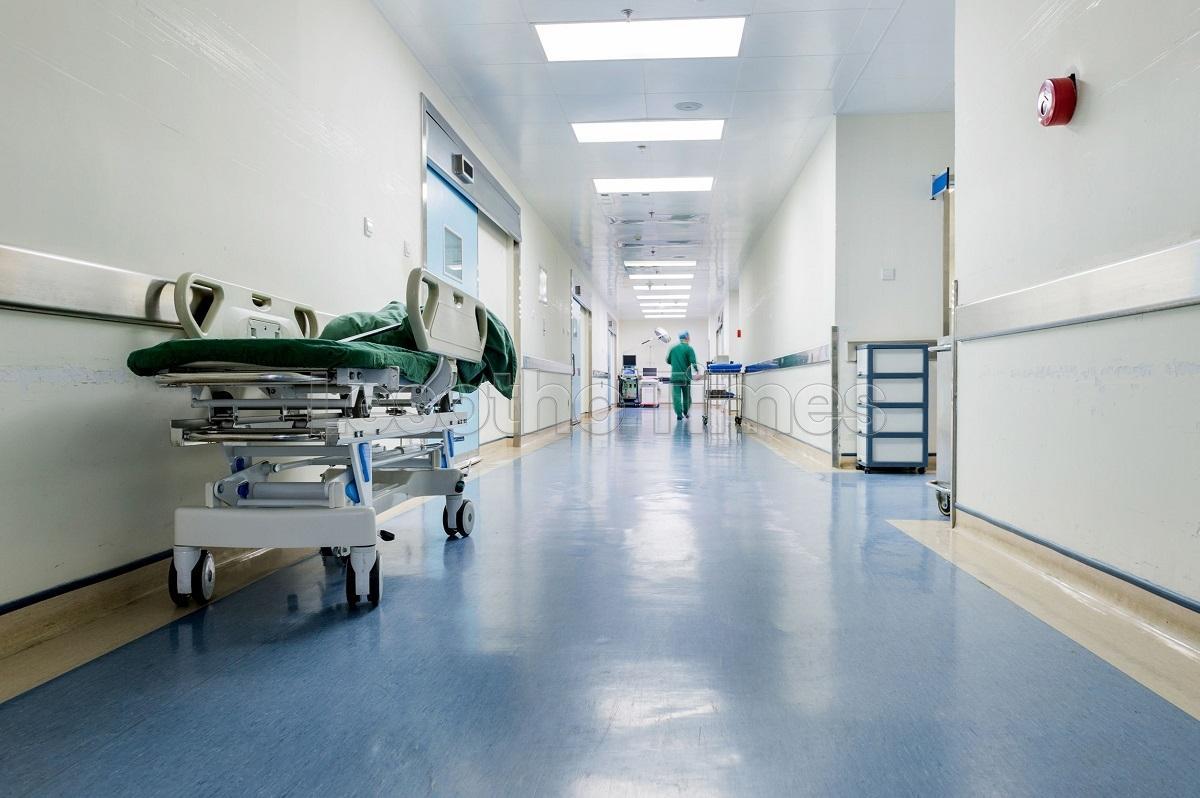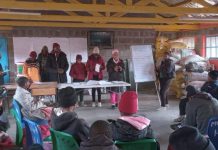Africa-Press – Lesotho. IN an unusual development, the government has authorized a privately owned medical facility to operate from within the premises of the Queen ‘Mamohato Memorial Hospital (QMMH), the country’s largest publicly owned referral hospital.
The private medical facility will serve as a referral centre for critical patients, the Lesotho Times can reveal.
The government says the new private wing, which will be operated by local company, Tsebo Health Solutions, starting 1 November 2025, aims to reduce the need to refer patients to South African hospitals.
However, critics of the arrangement say they foresee major problems with the deal. Firstly, they argue that it is not standard practice for a privately owned medical facility to be located within a public hospital. Secondly, they foresee a replay of the problems that occurred when the running of Tšepong was wholly subcontracted to a private South African hospital group before the government cancelled the deal citing ever escalating costs.
After cancellation of that original deal, the critics say it would have been better if the government had fully resourced Tšepong to operate as a public institution instead of rehiring a private outfit whose credentials are not fully tested, and which might again be motivated more by profit than the public good.
This local private entity, Tsebo Health Solutions, has partnered with Busamed, a private hospital group in South Africa that operates multiple facilities, including Busamed Gateway Private Hospital, Busamed Lowveld Private Hospital, and Busamed Paardevlei Private Hospital, offering comprehensive medical and surgical services.
Strangely, Tsebo/Busamed are yet to register with the Lesotho Medical, Dental, and Pharmacy Council (LMDPC), a key legal requirement before operating a health facility in Lesotho.
The Lesotho Times has seen a memo released on 10 October 2025 by the Deputy MD-Administration and Support Services at QMMH, Nthati Lebona, informing staff about the new private facility.
While the government claims the initiative will save treasury millions of maloti, the critics argue it might not be so.
Although contract details have not been disclosed, they say the arrangement could remain costly since this is a commercial arrangement with a private profit driven entity.
The better option would have been for the government to address its capacity issues and ensure QMMH or Maseru District Hospital are fully resourced to handle patients instead of outsourcing to a private player who could end up charging much more for services: the very reason the government threw out South Africa’s Netcare from QMMH in the first place.
History repeating itself
The opening of the private wing comes after the government of Lesotho terminated its Public-Private Partnership (PPP) with Tšepong Consortium.
The consortium consisted of South Africa’s Netcare Hospital Group and local companies: Afri’nnai Health, Excel Health Services, Women Investment, and D10 Investments.
The government had on 27 October 2008 entered into a contract with Tŝepong Consortium to design, build, part-finance, and operate the 425-bed QMMH and a gateway clinic. The project also refurbished and re-equipped three filter clinics in Qoaling, Mabote, and Likotsi to manage patient referrals to the hospital.
At the time, the PPP agreement was estimated at M1.165 billion (US$84 million). Construction was scheduled to take two years, followed by a 16-year operational period during which the Tšepong Consortium would manage all clinical and non-clinical services.
During that time, the consortium would receive a “unitary fee” of M255.6 million (US$18.4 million) from the government to cover operational costs and provide a return on debt and equity.
In 2021, the government terminated the agreement, citing concerns that it was gobbling half of the country’s health budget.
The Ministry of Health also alleged that Netcare was benefiting unfairly. After the contract was prematurely terminated, Netcare demanded M1.6 billion from the government for outstanding services.
Backdoor replication of PPP?
Critics say the government now appears to be returning the same private services through the backdoor under the guise of setting up a private wing within the QMMH facility in Ha Leqele.
A memo titled “Opening of New Private Wing – Tsebo Health Solutions”, approved by the QMMH Managing Director Clinical Health Management, Dr Kasanji Benjamin Ngoie, details that the private wing is designed to provide high-quality, patient-centred services.
“We are pleased to inform you that our hospital will soon have a new private wing as part of our ongoing efforts to enhance patient care and improve delivery,” the memo reads.
According to the memo, the private wing will be located around the area where Ward O and P, the retail pharmacy and coffee shop are currently located. It is projected to offer specialised consultations, private wards, executive suites, and more.
According to the memo, “relevant departments will receive further communication regarding roles, responsibilities, and operational guidelines.”
“We count on your cooperation and professionalism to ensure the successful launch and smooth running of this new wing. This initiative marks a significant milestone in our hospital’s growth and shared commitment to delivering exceptional healthcare service,” the memo addressed to staff reads.
Reducing SA referrals
Principal Secretary of the Ministry of Health, ‘Maneo Ntene, told the Lesotho Times that the private wing at QMMH is aimed at reducing referrals to South Africa. She said Lesotho loses significant amounts of money through these referrals.
Last year, reports suggested that Lesotho was struggling with medical debt amounting to M211 million owed to the South African government.
The health sector was allocated M3.4 billion for the 2023-2024 financial year and M3.1 billion for 2024-2025.
Ms Ntene confirmed that Tsebo Health Solutions will partner with Busamed to run the QMMH private wing.
“The Tsebo Health Solutions partnered with a hospital called Busamed, which has facilities in Durban, Bloemfontein, and Gauteng. So Tsebo partnered with Busamed to run that private wing at Mamohato,” she said.
“Lesotho refers patients to South Africa for cases where it lacks equipment, expertise, or specialists. We spend a lot of money on referrals. We decided to reduce referrals, because sometimes we pay for people who would have already passed away.
“For example, a patient may have a treatment date this week, but when they arrive in South Africa, they are given a date in December or January because Lesotho has been referring patients for decades. Our patients are deprioritised,” she explained.
Referring patients abroad is costly, she said.
“When we pay, it is like we are paying for a private service, yet it is just a referral. We analysed this and recognised that treating patients locally keeps them close to relatives and reduces costs significantly,” she said.
She said cancer treatment remains a challenge, as radiation therapy is still done in South Africa although Lesotho is now building a cancer hospital to address this gap.
“The only challenge that might remain for in the short term is with cancer cases requiring radiation in South Africa. We are still building a cancer hospital in the country. But in terms of general referrals, we are about to overcome them because we are tired of sending patients to South Africa.
“Busamed will come with specialists, providing resources, human capital, and equipment that we currently lack. If we monitor and maintain that standard, we will help a lot of Basotho,” she said.
Tsebo “not registered”
When asked if Tsebo Health Solutions is registered with LMDPC, Ms Ntene said, to her knowledge, it had applied.
Tsebo Health Solutions was registered with the Ministry of Trade, Industry, and Business Development on 30 April 2024, with shareholders HR MO-SE Holdings and Ntsekhe Holdings. HR MO-SE Holdings is owned by Hubbard Lephallo Monaheng, Relebohile Sefako, and Sekhonyana Molapo.
However, LMDPC President, Dr Makamole Lelimo, told the Lesotho Times that the council has not received an official application from Tsebo. The company had indicated it would submit all required documentation, which the council is still awaiting.
According to Dr Lelimo, medical practitioners, dental surgeons, or pharmacists must apply for approval to open a private wing under Order No.13 of 1970.
“Hmk, Tsebo Health Solutions… I don’t quite remember whether they applied, but I will check the records and ask my colleagues. They said we should expect an application, but I have not seen it. They mentioned something like that, but it has been a while,” he said.
Asked if it is acceptable for a private wing to operate inside a public hospital, he said the matter is still being discussed.
“But it is an issue we were aware of. That’s the official statement I can provide. We are expecting all their papers to be submitted,” he said.
Tsebo responds
One of Tsebo Health Solution’s directors, Sekhonyana Molapo, assured the Lesotho Times that they will be registered by the time the wing opens.
“There is no way we can open a hospital, ward, or any health service without a license or registration. Even if we have a date, it could change depending on compliance with the Dental Council’s protocols. When we enter this business, we ensure compliance with all regulations. By the due date, we would have met every requirement,” he said.
Mr Molapo explained that although documents were submitted, some were still outstanding and they were now in the process of completing them.
“If those documents are not available, we cannot open the facility. The Ministry of Health and QMMH will not allow it. There are too many checks and balances.”
He said that they had undergone a rigorous process to win the right to operate from within Tsepong. They had responded to an expression of interest from the government and had submitted a comprehensive bid which met the terms solicited from the bidders resulting in their selection.
“You must explain how you will execute the project, including sourcing clinical specialists and super-specialists. Doctors must be registered in Lesotho. There is no way to proceed without proper credentials, tried and tested. An expression of interest was released, preceded by a briefing session.”
For More News And Analysis About Lesotho Follow Africa-Press






